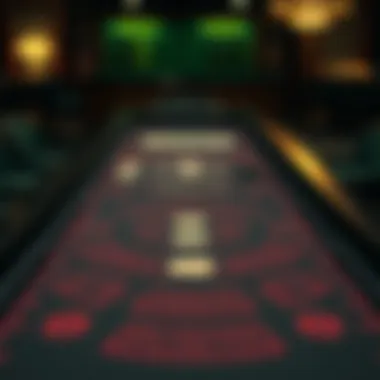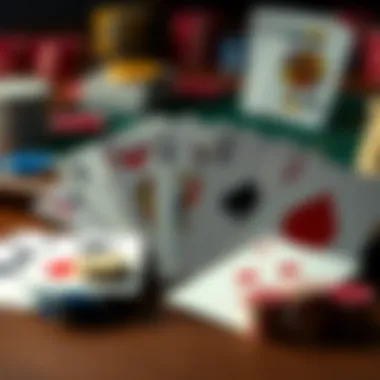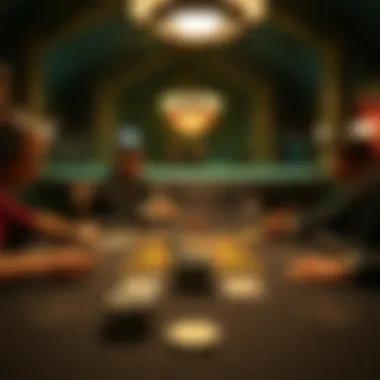Alternatives to Blackjack: Games, Strategies, and Insights


Intro
When you think about card games in casinos, blackjack often springs to mind. It’s fast-paced and deeply strategic, appealing to many players across the globe. But have you ever wondered what lies beyond the beloved blackjack table? After all, the world of gambling is vast, filled with exciting alternatives that can provide fresh challenges and enjoyable experiences.
In this article, we set journey into various card games that share similarities with blackjack. We’ll be exploring not just rules or strategies but delving deeper into the unique traits that each alternative has to offer. Whether you're a seasoned player looking to expand your horizons or a curious novice seeking to dip your toes into new waters, there's something for everyone. So grab your chips and let’s shuffle the cards.
Preface to Casino Card Games
Casino card games have become a hallmark of gambling culture, offering players excitement, skill, and strategic depth. This article unpacks the world of casino card games, setting the stage for an in-depth analysis of alternatives to blackjack. These games, rich in history and evolution, provide varied experiences that resonate with both seasoned gamblers and new players.
The journey into card games begins with understanding their evolution. Knowing how these games morphed over the years shines light on contemporary versions like blackjack and its alternatives. This historical perspective not only informs current gameplay but also underscores cultural significance, giving players an appreciation for the traditions intertwined with these games.
Exploring casino card games is essential for those who want to widen their gambling horizons. The allure of blackjack is undeniable, yet alternatives offer unique experiences that can enhance one's gameplay and strategy. This examination stems from both the need for variety in gaming sessions and the pursuit of optimizing one's chances of success in different environments.
Additionally, casino card games foster social interactions. Whether it's at a lively casino table or during an online game session, players often build relationships and learn strategies from one another. Understanding these elements makes the exploration of card games not just a skill-based pursuit but also a richly engaging social activity.
"In the world of gambling, every turn of the card can lead to fortune or folly."
The importance of diving into alternative games cannot be overstated. By comparing games through rules, strategies, and unique characteristics, players can discover new avenues that not only fulfill a desire for excitement but also adapt to their personal playing styles. This exploration is about enhancing both enjoyment and strategic prowess.
Understanding how and why certain games have risen in popularity offers essential insights into player behavior and cultural trends. This comprehensive analysis will shed light on these dynamics, giving a well-rounded understanding of how alternatives to blackjack fit into the broader gambling schema.
Understanding Blackjack
In the landscape of casino card games, Blackjack holds a seat of honor, uniquely blending luck and skill. Understanding this game is essential for grasping the alternatives that will be explored later. This section delves into its core elements, shedding light on the rules and mechanics that drive gameplay, as well as the strategic approaches that can enhance player proficiency.
Basic Rules and Gameplay Mechanics
At its heart, Blackjack is a straightforward game, but its nuances make it complex enough to engage players of all skill levels. The primary objective is simple: you aim to achieve a hand value totaling 21 or as close as possible without exceeding that number. In Blackjack, cards are valued as follows:
- Number cards (2-10): Face value.
- Face cards (King, Queen, Jack): Each valued at 10.
- Ace: Can count as either 1 or 11, depending on what benefits your hand.
The game begins with players placing their bets. Each player, along with the dealer, is dealt two cards; players' cards are typically face up, while the dealer has one card face down and one face up. The dealer's exposed card becomes a pivotal piece of information for players, as they strategize their next moves based on its value.
Players are then faced with choices:
- Hit: Take another card.
- Stand: Keep your current total.
- Double Down: Double your bet and take just one more card.
- Split: If you have two of the same value, split them into two hands.
The dealer must hit until their cards total 17 or higher, which introduces an element of unpredictability for players.
Strategies and Skill Development
Beyond grasping the basic gameplay, players who truly wish to excel at Blackjack can employ a variety of strategies that take into consideration the house edge, the dealer’s visible card, and their own hand value. Mastering these strategies is no small feat; it involves understanding probability, risk management, and the psychological aspects of gambling.
A few fundamental strategies include:
- Basic Strategy Chart: Players often use a simple chart to guide their decisions, outlining whether to hit, stand, split, or double based on their hand and the dealer's upcard.
- Card Counting: While a contentious topic, card counting can provide a knowledgeable player with a statistical advantage. By keeping track of high and low cards that have been dealt, a player can adjust their bet sizes and make more informed decisions.
- Bankroll Management: Setting a budget before playing is vital. Skilled players know not only how to maximize their winnings but also to minimize their losses. Understanding when to walk away can be just as critical as the gameplay itself.
Ultimately, developing a strategy for Blackjack is about understanding the game at a deeper level. Each hand, each decision made at the table, factors into a broader picture concerning the odds and potential outcomes. Knowledge and practice refine these skills, enabling players to shift the balance of power in their favor.
"The more you know about Blackjack, the more comfortable you'll be making decisions, ultimately shaping your experience at the table."
This understanding of Blackjack serves as a cornerstone, enhancing the appreciation for alternative games which mirror its dynamics, but with their unique twists. Each of these alternatives presents a fresh challenge while still drawing from the fundamental principles that make Blackjack so enduring.
Games Similar to Blackjack


Exploring games like blackjack is essential not just to diversify our gambling experiences, but also to understand the various mechanics and strategies that can enhance our gameplay. Blackjack has carved its niche, but numerous alternatives offer compelling variations that can appeal to both strategic players and those looking for a more relaxed experience. These games often feature unique rules, strategies, and house edges that can significantly impact how a player approaches their session. Delving into these similarities and differences can enlighten players about the broader spectrum of options available at tables around the globe.
Spanish
Rules of Spanish
Spanish 21 presents an engaging twist on traditional blackjack. One of the most critical aspects of Spanish 21 is the absence of tens in the deck. This small modification substantially changes the way the game is played. Players must handly adjust their strategies accordingly. Without the tens, the natural blackjack—a combination of an ace and any ten-value card—becomes rarer, which impacts the payout structure.
The game retains many of the rules found in standard blackjack, including hitting, standing, doubling down, and splitting pairs. However, its specific rules can lead to better outcomes for the players. For example, in Spanish 21, players can re-split aces, which allows for more extensive gameplay possibilities compared to conventional blackjack. This feature makes Spanish 21 a compelling choice, especially for gamblers seeking varied experiences.
Strategy Differences from Blackjack
When it comes to strategy, Spanish 21 does diverge from standard approaches to blackjack. The absence of tens in the deck encourages players to rethink their standing and hitting decisions. For instance, players may find that more aggressive doubling down strategies become advantageous, especially when holding a strong nine or ten against weaker dealer cards.
Moreover, the option to play with specific rules such as surrendering after doubling down gives players more flexibility. Being able to surrender can sometimes be a game-changer, especially in scenarios that might require a retreat from a seemingly losing hand. This strategy flexibility truly sets Spanish 21 apart, marking it as an appealing choice for discerning players.
Pontoon
Unique Features of Pontoon
Pontoon stands out as a cousin to blackjack, offering a playful and dynamic environment. The game is characterized by its lively atmosphere and rules that may seem foreign to those used to traditional blackjack. For example, winning hands are called "pontoon" when players get a natural 21 with an ace and a face card, earning a more lucrative payout than in standard blackjack.
Another intriguing aspect is that in Pontoon, both dealer cards are faced down, known as the "hole" cards, making the gameplay more mysterious and suspenseful. Such features significantly enhance the thrill. This combination of mystery and potential high rewards keeps players on their toes and provides a refreshing change from standard casino fare.
Comparative Strategies
Strategies for Pontoon have their distinct flavor as well. Unlike blackjack, where players might opt for a safer playstyle, Pontoon's rules encourage more bold moves. For instance, players can choose to "buy" a card by paying extra when they believe the outcome may favor them. This unique feature allows players to take risks that could lead to substantial rewards.
However, it’s essential to tread carefully as different local rules may apply in various establishments. Understanding these nuances can be critical to effectively navigate your gameplay strategy. Mastering these comparative strategies can enhance one's gameplay experience and foster a deeper appreciation of the game's unique structure.
Super Fun
Game Variants Explained
Super Fun 21 shakes things up with its refreshing array of options for players. The standard blackjack rules are adapted to create a unique gameplay experience. One distinct characteristic is the game’s approach to suits; players can achieve a blackjack with any suited cards, doubling the player’s win potential.
The game also allows for unique rules like the ability to double down on any number of cards, which can create different pathways to victory. This freedom opens up a whole new realm of strategy and gameplay, making each hand unpredictable.
Player Advantages
In terms of advantages for players, Super Fun 21 takes the cake. The player-friendly rules like paying 2:1 on a natural blackjack and being able to double down give players ample opportunities for bigger payouts. Additionally, the option to split and re-split aces does not exist, leading to faster-paced games. These features are particularly appealing for those willing to venture beyond the more rigid aspects of traditional blackjack.
Double Exposure Blackjack
Exposure Mechanic Overview
In Double Exposure Blackjack, players have a leg up since both dealer cards are dealt face up. This exposure mechanic transforms the way players make critical decisions during the game. Having full visibility of the dealer’s hand allows for much more informed betting decisions.
However, with this advantage comes a catch; the house edge is slightly higher due to adjustments in payouts. For instance, winning blackjack hands may pay even money instead of the standard 3:2. This trade-off is crucial for players to consider, as they balance the risks and rewards of this revealing mechanic.
Strategic Implications
The strategic implications of playing Double Exposure blackjack can be both thrilling and complex. Players can leverage the visible dealer’s hand to their advantage, often opting for calculated bets. For example, knowing a dealer has a weak hand of 4 or 5 could encourage players to double down more frequently.
However, it requires a shift in strategy compared to regular blackjack: a player must weigh the benefits of seeing two dealer cards against potentially losing out on better payouts.


Blackjack Switch
Mechanics of Switching Hands
Blackjack Switch offers players a captivating twist, allowing them to swap the second cards between two hands. This mechanic introduces an exciting layer of strategic depth that enables savvy gamblers to maximize their winning potential. It’s not just a game of chance; switching hands can lead to superior combinations that one wouldn’t typically encounter in traditional blackjack.
Another fascinating aspect of Blackjack Switch is the “push” rule applied to tied hands. If a tie occurs, the player’s hand will not lose; rather, it will push against the dealer. This twist can create a more resilient playing experience, as players focus on strategy that promotes switching up hands.
Optimal Strategies
When it comes to optimal strategies for Blackjack Switch, players need to adapt quickly. The flexibility of switching cards means that players can pivot mid-hand based on the dealer’s exposed card. It’s essential to know when to make that switch to maximize your potential to win.
Moreover, players need to be cognizant of how their strategies shift as they play multiple hands. Keeping a cool head and carefully analyzing each scenario gives practical insights into when to switch or play conservatively. Mastering this game can often lead to rewarding experiences at the table.
Comparative Analysis of Alternative Games
In the realm of casino card games, understanding the nuances between various alternatives to blackjack is not just a mere academic exercise—it's essential for any player hoping to enhance their gaming strategy. This section dives into the comparative analysis between these games, focusing on two crucial elements: the role of skill versus luck and examining the house edge, both of which significantly influence player experience.
Skill versus Luck
When one reflects on card games, the eternal debate of skill versus luck surfaces with persistent vigor. It's often said that while luck may get you in the door, skill keeps you in the game longer. In games like blackjack, having a solid grasp of basic strategy can drastically improve your chances against the house. However, when exploring alternatives like Spanish 21 or Pontoon, the dynamics shift slightly.
In Spanish 21, for instance, players need to employ strategic plays based upon the rules dictating the game. Here, optimal decision-making becomes paramount. Players must be vigilant about card counting and tactical hits. It's not just about the cards you hold; it's about how those cards interact with the dealer’s. On the other hand, games like Super Fun 21 introduce a luck factor as you may get dealt a hand that looks promising at first glance, only to find that your decisions had little bearing on the outcome.
"In gambling, luck is a fickle friend. Skill, though, is a loyal companion."
In essence, understanding how much leeway you have in terms of skill can change your approach. Not all games allow for strategic depth akin to blackjack; thus, players must adapt their mindset accordingly.
House Edge Comparison
A significant consideration when analyzing card games is the house edge—the mathematical advantage the casino holds in each game. This figure doesn’t just represent a number; it’s a forecasting tool that indicates how much players can expect to lose over time. In traditional blackjack, conditional on the rules, the house edge can be as low as 0.5% if one follows optimal strategy. But how do alternatives stack up against this benchmark?
Let's take a closer look:
- Spanish 21: Generally offers a lower house edge of around 0.4%, largely due to its player-friendly rules like bonus payouts for certain hands.
- Pontoon: This game typically features a house edge closer to 0.5% as well, yet provides some unique twists that equalize its competitiveness with blackjack.
- Super Fun 21: In this game, the house edge could rise to about 0.8%, depending on specific house rules governing double downs and splits.
- Double Exposure Blackjack: This variation places the dealer’s cards face up, which sounds beneficial, but usually comes with a higher edge of around 0.67%, making it less favorable for the player than traditional blackjack.
From this analysis, it's evident that not all card games are created equal in terms of player advantage. Some alternatives lend themselves to lower rates of loss potential, while others demand a more tactical mindset despite higher risks. Being informed of the house edge is one of the best ways to assess which games best align with your gambling strategy and risk tolerance.
As players navigate the landscape of alternative card games, leveraging both the aspects of skill and understanding house odds can greatly influence their overall success and enjoyment. Thus, the world beyond blackjack harbors diverse options that cater to various preferences, emphasizing the need for a discerning eye and strategic acumen.
Game Formats: Live and Online
When it comes to card games like Blackjack, the format in which the game is played can greatly influence the experience and strategy involved. In this section, we will explore the significance of both live and online formats, focusing on their unique aspects, benefits, and possible drawbacks. Understanding these formats is crucial for players seeking the most fulfilling outing, whether in-person at a casino table or from the comfort of their homes.
Interpretation of Live Games
Atmosphere and Engagement
The atmosphere in a live game setting adds an intrinsic value that online platforms struggle to replicate. The buzz of the casino floor, the sound of chips being shuffled, and the collective anticipation of players can create a palpable energy. This environment enhances engagement and can lead to more thrilling gameplay. One key characteristic that stands out is the social interaction between players and dealers. For many, the camaraderie developed at the table can create lasting memories.
However, this engagement is not without consideration. The unique feature of a physical table game is that it necessitates stamina and concentration, as players may experience fatigue from long sessions. But for those who thrive on the social dynamics, the benefits of an immersive atmosphere generally outweigh the negatives.
Social Dynamics at the Table
Social dynamics in a live game setting can significantly affect gameplay. Interactions among players can influence decision-making and strategy. A friendly banter or shared strategy can lead to a collaborative spirit, making the experience memorable. The camaraderie at the table is something that online games often lack. Players may find it reassuring to share their wins and losses in person.


However, this aspect can also lead to pressure. Some individuals may feel the need to conform to the table’s dynamics, which can impact their gameplay negatively. It's essential for players to find a balance, enjoying the lively social interactions while still maintaining focus on their strategies.
The Rise of Online Alternatives
Convenience and Accessibility
Online card games have risen in popularity primarily due to their convenience and accessibility. Players no longer need to dress up, travel to a casino, or wait for a seat at a table. With just a few clicks, anyone can join a game from their sofa. This key characteristic of online platforms allows for greater flexibility in play.
Yet, this convenience has its downsides. The absence of a physical presence can lead to distractions at home. Some players may find it harder to focus when there are so many other things vying for their attention. Nonetheless, the ease of access to a plethora of games outweighs these challenges for many players.
Variations in Online Gameplay
The online arena boasts a variety of card game formats that differ from traditional live games. These variations often come with unique rules and mechanics that can provide fresh challenges. For instance, some online platforms offer innovative gameplay experiences that mix classic elements with modern twists, such as interactive graphics or different betting structures. The adaptability of online gaming allows players to explore multiple versions of their favorite games.
However, too many options can sometimes lead to confusion. Players may feel overwhelmed by the choices available, making it harder to pick a game that matches their skill level and interest. Despite this, the excitement of discovering new variations keeps the online card gaming scene alive and vibrant.
"The evolution of game formats has transformed how players engage with card games, offering a dual experience that caters to diverse preferences."
As we can see, the formats—live and online—both have strengths and weaknesses. Each offers different levels of social engagement and convenience, providing players a range of choices to enhance their gameplay experience.
The Future of Card Games Like Blackjack
The landscape of card games, particularly those mirroring blackjack, is undergoing a profound transformation driven by a variety of factors. The importance of exploring the future of these games cannot be overstated. Not only does it provide gamers with insight into evolving gameplay mechanics, but it also allows stakeholders in the gambling industry to adapt to an ever-changing market. As technology advances and players' preferences shift, understanding the trajectory of such games becomes crucial for both enjoyment and strategic engagement.
As we delve deeper into this subject, we see that certain elements, benefits, and considerations are paramount when assessing what lies ahead for card games akin to blackjack. Players, casino operators, and developers must navigate this dynamic environment, ensuring they remain relevant amidst fierce competition and shifting consumer demands.
Technological Innovations
In the realm of card games, technology plays a key role in shaping the future. One significant innovation is the integration of augmented reality (AR) and virtual reality (VR). Imagine stepping into a casino from the comfort of your own home, engaging in multiplayer blackjack styles while experiencing the sights and sounds of a bustling floor. It's not just a fanciful dream; it's become increasingly feasible with developments in AR and VR technologies.
Further innovations include the use of artificial intelligence (AI) to personalize gaming experiences. Casinos can analyze your playing habits and preferences to tailor suggestions and optimize game settings. In addition, the deployment of machine learning algorithms helps refine gameplay and enrich player engagement.
Moreover, the blockchain technology revolution is starting to leave its mark as well. Smart contracts can ensure fairness and transparency in online gaming environments, which could enhance trust among players. Cryptocurrency acceptance is also on the rise; players can enjoy greater anonymity, which is especially appealing in the online sphere.
Emerging Trends in Gamification
Gamification is another trend that is reshaping how players interact with card games. By incorporating elements such as leaderboards, challenges, and rewards, game developers can create a more engaging experience. This motivates players to hone their skills and participate more actively. Casino operators are increasingly looking for ways to gamify their offerings, providing incentives that keep players coming back for more.
With the advent of social gaming platforms, players can also engage with friends and family, creating a more shared experience. This social aspect often leads to increased retention rates, as players enjoy competing against known opponents rather than unknown faces across the virtual table.
Closure
As we draw the curtains on our exploration of alternatives to blackjack, it becomes abundantly clear that the world of card games is vast and diverse. The ability to diverge from the traditional game not only adds variety but also enriches the gaming experience for individuals of all skill levels. Engaging with the alternatives discussed fosters deeper strategic thinking, appealing to gamblers seeking both thrill and skill-based challenge.
Players who may have mastered blackjack can find new horizons in games like Spanish 21 or Pontoon, which bring their own unique flavor and strategy. For some, embracing these alternatives can rekindle interest, as the diverse rules and gameplay mechanics breathe freshness into their gaming routines.
Moreover, understanding the different dynamics of games expands one’s knowledge base, contributing to a more rounded understanding of casino strategies in general. Evaluating these options also helps in recognizing one’s preferences; whether it’s the element of risk, the excitement of bluffing, or simply enjoying the camaraderie at live tables, different games cater to distinct tastes.
As seen, the essence of gambling is not solely rooted in the luck of the draw but in the engagement and enjoyment derived from the entire gaming experience.
Reflecting on Gaming Choices
In scrutinizing our gaming choices, it's important to consider not merely what game appeals to our interests but also what aligns with our strategic inclinations. In a constantly evolving landscape, some players find they thrive in a more unpredictable environment, while others prefer the calculated strategies associated with games like blackjack.
This reflection calls for a deeper understanding of why we gamble. Is it purely for entertainment? Or is there the stirring desire to outsmart an opponent or the dealer? Recognizing these motivations may lead to selecting games that resonate more profoundly with our personal gaming philosophy. Players should not hesitate to switch gears—test the waters of various card games. If the stakes are higher for your enjoyment, it might just be the case that a game like Super Fun 21 offers the spice you've been missing.
Encouragement for Exploration Beyond Blackjack
Diversity is what keeps the game alive. By stepping outside the boundaries of traditional blackjack, players open themselves to new experiences that could ignite a long-lost excitement for the game. Exploring different card games is not just about gambling; it’s also an opportunity to engage with fellow players, learn new skills, and expand one’s circle in the gaming community.
Consider trying a lesser-known variant. Whether it’s continuing the combustible fun of blackjack with a twist or opting for a quirky game like Double Exposure, these alternatives often carry surprising depths of strategy.
Embrace the unexpected as you uncover new favorites, and in doing so, you’ll likely enhance your overall enjoyment and investment in the world of card games. There are countless alternatives waiting to be discovered, making it a journey worth taking for any avid gambler.







